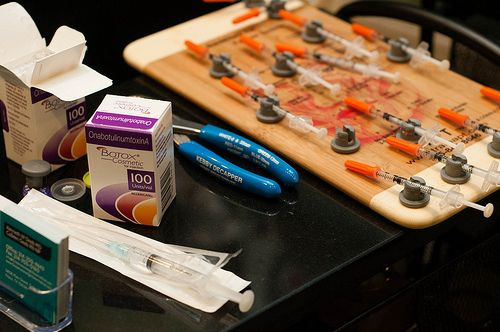Botox Could Treat Prostate Cancer By 'Freezing' Tumors

Botox may no longer be used to treat only wrinkles. The cure to prostate cancer may lie in the jab of a needle. Men with localized prostate cancer that has not spread beyond the prostate gland could benefit from the "freezing" effect a Botox injection could have on cancerous tumors, according to a recent clinical trial.
Prostate cancer in men is usually developed from the prostate's gland cells. The American Cancer Society says that these cells are responsible for making the prostate fluid that is added to a man’s semen. While there are other types of cancer that also start in the prostate gland such as sarcomas, small cell carcinomas, and transitional cell carcinomas, they are rare. Localized prostate cancer accounts for 90 percent of all prostate cancers the American Cancer Society reports.
Typically, men with localized prostate cancer survive. Those who have prostate surgery are more likely to survive cancer than men who use the watchful waiting technique. According to the most recent data, when including all stages of prostate cancer, the 15-year relative survival rate among patients is 93 percent.
Researchers at the University of Texas are conducting a clinical trial to examine the effect Botox would have on the prostate gland in men with localized prostate cancer. To date, there are 15 patients with prostate cancer who will have half of their gland injected with Botox and the other half with saline. This technique will be used as a means to compare the effects of the two on cancerous tumors.
The 15 men participating in the trial are scheduled to have a radical prostatectomy — surgery to remove the prostate — at a later date. After the patients undergo surgery, the cancer cells will be compared to measure the effects the Botox had on the tumors, according to the Daily Mail. Results from three participants have so far shown that the tumors injected with Botox have shrunken significantly while the other side of the gland, which has saline, did not. This finding could suggest that Botox would have similar effects on other types of solid cancers.
“It is not known how Botox could exert an effect on cancer cells," Professor Raj Persad, consultant in urology-oncology at North Bristol NHS Trust, told the Daily Mail. “It may deprive them of nerve elements crucial to their survival, but more research is needed to look at the effectiveness and to compare outcomes with the existing treatments.”
Currently, treatments for localized prostate cancer include surgery to remove the prostate, radiotherapy, and hormone therapy. However, the American Cancer Society says these treatments carry a high risk of significant adverse effects that include incontinence, erectile dysfunction, or impotence.
The clinical trial is also observing men with benign prostatic hyperplasia/lower urinary tract symptoms (BPH/LUTS) after receiving a Botox injection. BPH/LUTS is an age-related condition where the prostate enlarges and pushes against the urethra, causing a great deal of pain, says the Mayo Clinic.
This pilot study isn’t the first to explore the effects of Botox on men with BPH. In a similar study presented at the annual meeting of the American Urological Association (AUA) in Anaheim, Calif., researchers at the Chang Gung University Medical College, Taiwan, and the University of Pittsburgh School of Medicine found 75 per cent of men with BPH injected with Botox had some easing of their symptoms. “Botox has been shown to be safe and effective. One injection, which takes five minutes, can prove effective for a year,” the researchers said.
Botox may soon become a treatment for more than just treating wrinkles, and could one day cure cancer.
For more information on the current clinical trial, click here.
Published by Medicaldaily.com



























